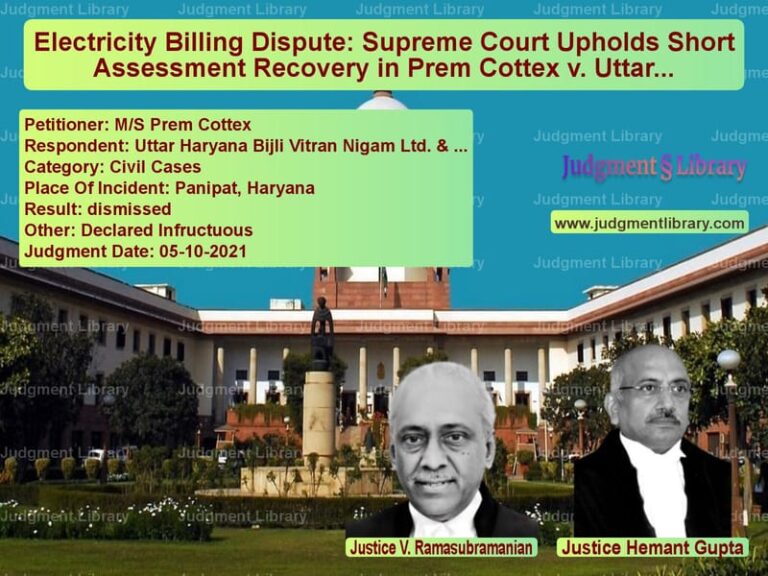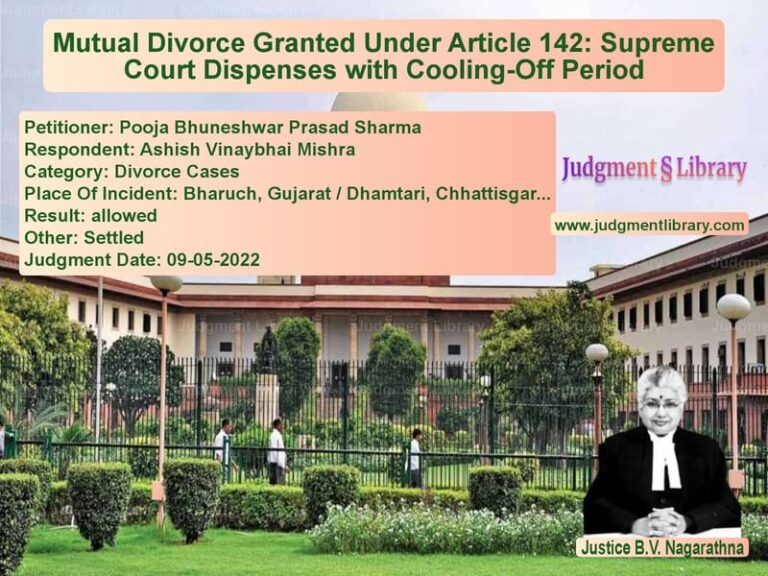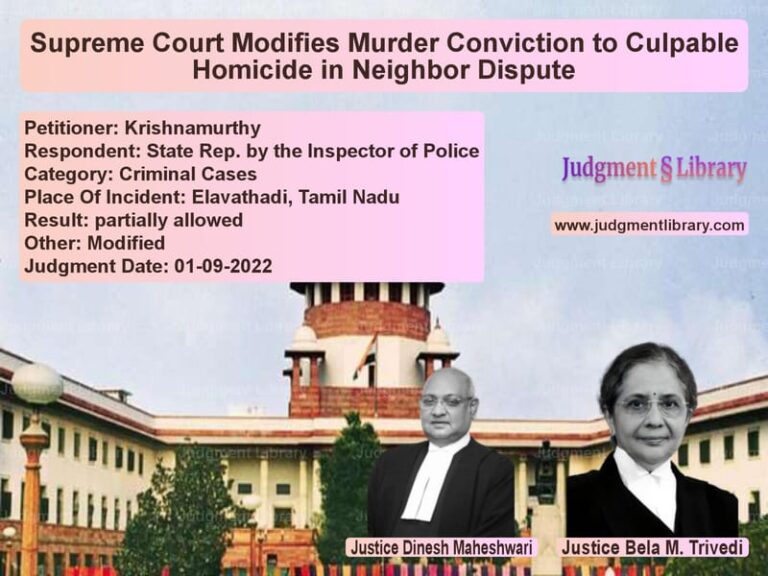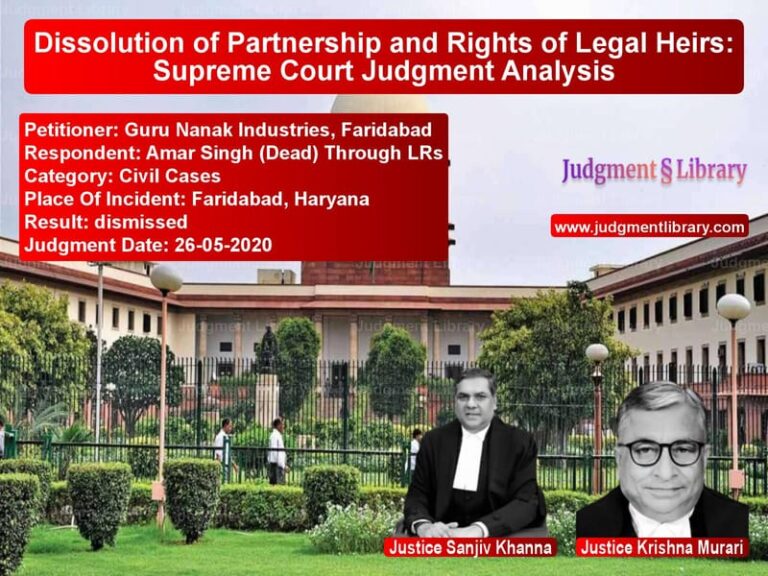Maintainability of Writ Petitions Against Private Educational Institutions: A Landmark Judgment
The case of Marwari Balika Vidyalaya vs. Asha Srivastava & Ors. addresses a crucial legal issue: whether a writ petition is maintainable against a private unaided educational institution receiving a limited government grant. The Supreme Court’s ruling in this matter has significant implications for employment rights in private schools and the scope of judicial intervention in service matters.
In this case, the appellant, Marwari Balika Vidyalaya, a private school receiving government aid limited to dearness allowance payments, dismissed an assistant teacher, Asha Srivastava. The Calcutta High Court reinstated the teacher with back wages, prompting the school to challenge the decision before the Supreme Court. The Supreme Court ultimately ruled that the writ petition was maintainable and upheld the High Court’s order for reinstatement.
Background of the Case
Asha Srivastava was appointed as an assistant teacher at Marwari Balika Vidyalaya in 1985. She served on probation until 1995, and her employment was subsequently regularized. However, disputes arose regarding salary approval from the education department, leading her to file a writ petition seeking confirmation of her appointment.
Her action resulted in disciplinary measures from the school, including suspension and eventual termination. She challenged her dismissal in the High Court, which ruled in her favor and ordered her reinstatement with full back wages. The school appealed to the Supreme Court, arguing that the writ petition was not maintainable against a private unaided institution.
Arguments by the Petitioner (Marwari Balika Vidyalaya)
- The school was a private unaided institution and did not fall under the definition of ‘State’ under Article 12 of the Constitution.
- The writ petition was not maintainable as there was no direct governmental control over the management of the school.
- The dismissal was based on insubordination and misconduct, and the teacher was given due opportunity to explain her actions.
- Several Supreme Court precedents, including Delhi Public School v. M.K. Gandhi and Satimbla Sharma v. St. Paul’s Senior Secondary School, had ruled that writ petitions were not maintainable against private unaided schools.
Arguments by the Respondent (Asha Srivastava)
- The school received government grants for dearness allowance, which brought it within the ambit of public law.
- The termination was arbitrary and in violation of service regulations, as no proper disciplinary inquiry was conducted.
- Her employment required approval from the education department, and thus, her dismissal should have also required similar approval.
- The High Court was correct in treating the termination as void and ordering reinstatement.
Supreme Court’s Ruling
The Supreme Court upheld the maintainability of the writ petition, stating:
“The appointment was made with approval from the education department, and once approval for appointment was necessary, its removal must also be subjected to the same requirement. The writ petition is, therefore, maintainable.”
- The Court emphasized that private institutions receiving government aid—even if limited—are subject to judicial review under Article 226 of the Constitution.
- The school failed to obtain approval for the teacher’s dismissal, making the termination illegal.
- The absence of a proper inquiry before termination was a violation of natural justice.
As a result, the Supreme Court upheld the High Court’s decision, directing reinstatement and full back wages.
Implications of the Judgment
This ruling sets an important precedent in service matters related to private educational institutions:
- Expansion of Writ Jurisdiction: Courts can entertain writ petitions against private entities performing public functions.
- Protection for Employees: Employees of aided private institutions have recourse against arbitrary dismissals.
- Need for Governmental Approval: Schools receiving aid must ensure compliance with governmental service regulations.
- Ensuring Due Process: Private schools must conduct proper inquiries before termination to avoid legal challenges.
In conclusion, this judgment underscores the principle that private institutions benefiting from government aid are subject to judicial scrutiny, ensuring fairness in employment practices.
Petitioner Name: Marwari Balika Vidyalaya.Respondent Name: Asha Srivastava & Ors..Judgment By: Justice Arun Mishra, Justice Navin Sinha.Place Of Incident: Kolkata, West Bengal.Judgment Date: 14-02-2019.
Don’t miss out on the full details! Download the complete judgment in PDF format below and gain valuable insights instantly!
Download Judgment: Marwari Balika Vidya vs Asha Srivastava & Or Supreme Court of India Judgment Dated 14-02-2019.pdf
Direct Downlaod Judgment: Direct downlaod this Judgment
See all petitions in Termination Cases
See all petitions in Disciplinary Proceedings
See all petitions in Judgment by Arun Mishra
See all petitions in Judgment by Navin Sinha
See all petitions in dismissed
See all petitions in supreme court of India judgments February 2019
See all petitions in 2019 judgments
See all posts in Service Matters Category
See all allowed petitions in Service Matters Category
See all Dismissed petitions in Service Matters Category
See all partially allowed petitions in Service Matters Category







